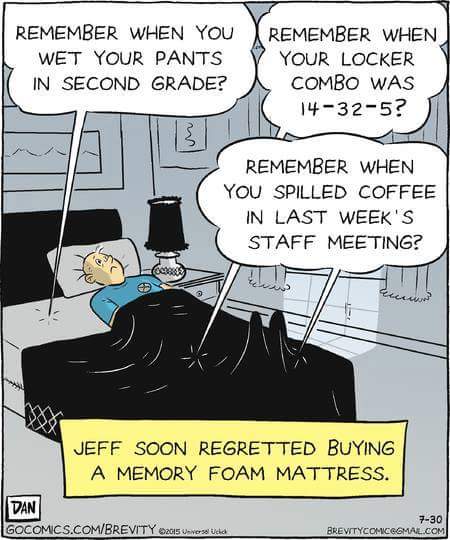|
Last updated February, 2017. note: we link to our free guide to mindfulness and meditation at the bottom of the page (no email or registration required). Earlier this week we posted the following cartoon on social media: Our comment on it was: "Funny cartoon, but this is exactly what your mind does ALL the time. We are more aware of it at night - in bed - because our attention doesn't have a lot to be distracted by. So, it tends to get caught up in mind-made activity (thoughts, emotions, stories, et cetera). Regardless, if you learn to meditate, you can strengthen your awareness of mental drama, and prevent your attention from being hijacked by it (day or night)." To elaborate, thoughts and emotions constantly arise and cease. At times, they appear to fit with the situation at hand. Quite often, however, they don't ("Why am I thinking about something that happened 15 years ago?"). If you put focused attention on mind-made activity, you'll find it's both entertaining and frightening. It's like watching a movie that doesn't always make a lot of sense. Because of this, people tend to ask "What thoughts do I pay attention to, and what thoughts do I move my attention away from?" In the past, I would answer with "The fact that you are asking this question points to your mind trying to make something simple into something complicated. Only you know which thoughts are relevant in any given moment, and it shouldn't be hard to determine." But, people kept asking the question. That led me to re-evaluate my answer and come up with something better (well, hopefully!): Is it helpful to what I'm doing right here and now?When you are trying to determine if thoughts are skillful (useful), simply ask "Is it helpful to what I'm doing right here and now?"
For instance, if there are thoughts about your personal budget while you're working on a project for your job, it's not helpful to the present moment. If you're reviewing your finances, however, it is helpful to the present moment. If you're having dinner with your significant other and there are thoughts about items you need to discuss with your boss, it's not helpful to the present moment. If you're brainstorming ideas and topics to cover in an upcoming meeting with your boss, however, it is helpful to the present moment. What you will find is many (perhaps most) thoughts aren't helpful to the present moment, regardless of what you are currently doing. They are just dwellings and ruminations that create struggles such as stress, fear, depression, anxiety, regret, worry... Your mind drags you into the past with thoughts about what you did (or didn't) do, or how you should have done things differently. It projects you into the future to worry about something that might happen (most likely it won't happen, though). Or, it creates an alternate reality (fantasy) for you to get lost in. The point is, your mind always wants to be somewhere else. "Is it helpful to what I'm doing right here and now?" quickly cuts through the mental drama. One note of caution - it's easy to let this question turn into analyzing thought, which is counter-productive to mindfulness and meditation. Mindfulness and meditation teach you to notice what's happening in your mind without getting caught up in it. Analyzing, on the other hand, is actively engaging with thought. This ends up creating more thought and, from there, it's easy to getting buried in a landslide of mind-made activity (thoughts about thoughts about thoughts...). In summary, when you become aware of thought:
Simple, but - like most things in life - it requires practice and consistent effort. The results are worth it, though. What are you trying to "cope" with?
Coping doesn't work - addressing the root cause does. We'll show you how. Comments are closed.
|
